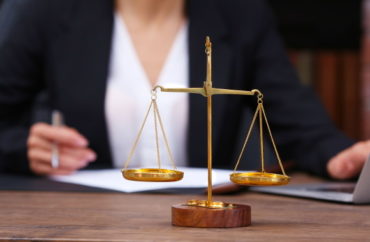
Conservatives and libertarian students at George Washington University Law School increasingly fear that sharing their views during class will result in lower grades, GWU Law Professor Jonathan Turley reports.
The concern of speaking freely never came up until the past few years, Turley noted, though it is “now routine.”
“With the start of classes at George Washington Law School, I have already had visits to my office of conservative and libertarian students asking if I thought they could speak freely in other classes without being penalized by professors,” he reported Aug. 30.
Asked by The College Fix what he tells them in response, Turley said he tells them to stand firm.
“The growing orthodoxy and intolerance on campuses creates a chilling effect on speech where students self-censor. Students should not yield to such pressure and lose a vital aspect of their undergraduate and graduate education,” he told The Fix via email Sept. 20.
“Life is not like a Monopoly game where you get to go around the board repeatedly. You go around once and need to make the most of this experience,” he said. “To remain silent (or even worse to mouth expected viewpoints) is to surrender an essential part of your education.”
“Free speech values atrophy and die from lack of use. Despite the growing intolerance on many campuses, conservative and libertarian students need to speak out and to report any faculty members who show intolerance for opposing views.”
The problem is not unique to GW Law.
A recent survey of University of North Carolina students, for example, found 42 percent of conservatives worry that their professor’s ideology may impact their grade, versus just seven percent of liberal students.
MORE: Most Republican students expect to self-censor in class to avoid upsetting others
For Turley, the problem boils down to a lack of ideological diversity among faculty, perpetuated by hiring committees who tend to “replicate their own viewpoints and bias.”
“It is not just students but faculty who face this pressure to self-censure,” he wrote on his blog. “Faculty members risk cancel campaigns that threaten publications, conference invitations, and even their employment if they voice dissenting views.”
A recent study found just nine percent of law professors across the nation are conservative.
John Banzhaf, emeritus GWU law professor of public interest, said the amount of students who fear grading bias from ideological professors is a “serious problem” that warrants discussion.
“Indeed, the very idea that students would think so little of the ethics, honor, and professionalism of even a few professors (especially at a top-ranked law school) that they would engage in such unfair and destructive behaviors [is] a cause for very serious concern itself,” Banzhaf wrote in an email to The College Fix.
Even without concrete evidence of grading bias, students may have a sufficient basis for their concerns. As an example, Banzhaf pointed to recent examples of students who have faced investigations for actions such as using the word “Jew” in private conversation and displaying posters critical of civil rights abuses by Communist China.
In June, George Washington University students launched a petition to cancel a class taught by U.S. Supreme Court Justice Clarence Thomas. GWU leadership, notably, did not cave to student demands, though Justice Thomas ultimately decided not to teach the fall semester course.
Students at other law schools have similarly attempted to shut down opposing viewpoints.
At Yale, a bipartisan free speech panel featuring Kristen Waggoner from Alliance Defending Freedom was disrupted with shouting, requiring the police to come.
Banzhaf suggests anonymous grading—where students are assigned an ID number that prevents professors from knowing their names—as one way to offer reassurance of a fair system.
“More than 40 years ago, I persuaded GWU Law to adopt anonymous grading because some students – African American students in particular – were alleging that they were being discriminated against in grading because of their race,” he said. “With this type of corrosive and dangerous belief, it’s something almost impossible for a completely innocent professor to refute, and for the complaining students to accept nothing more than verbal reassurances.”
Though anonymous grading is technically used now, professors can still find out who ID numbers belong to and alter the grade afterward.
Restoring a truly anonymous system could alleviate concerns, he said. At the very least, student worries should “be discussed and solutions sought,” Banzhaf said.
The College Fix reached out to GWU Law’s chapter of the Federalist Society but did not receive a response. GWU Law also did not respond to a request for comment.
MORE: Law school will not punish students who shouted down conservative scholar
IMAGE: Africa Studio / Shutterstock





Please join the conversation about our stories on Facebook, Twitter, Instagram, Reddit, MeWe, Rumble, Gab, Minds and Gettr.